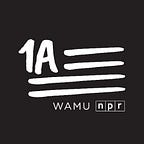A New Democratic Party Rises In The South
1A Across America producer James Morrison talked with progressive grassroots activists in Alabama about their efforts to break Republican control of the South.
In the Republican-controlled American southeast, progressive activists say a recent wave of blue victories signals a changing political landscape.
Voters in Louisiana and Kentucky sent a Democrat to the governor’s mansion this month, even after President Trump held campaign events for the Republican candidates in each state.
The Virginia state legislature flipped entirely blue this month, giving Democrats control of both chambers and the governor’s office.
In Alabama, Pat Siano with Organize Alabama says President Trump’s victory in 2016, coupled with activist movements like Black Lives Matter and the March for Our Lives, is reinvigorating progressives.
Activists, she says, are creating stronger political networks, funding streams and a new slate of younger, more energized candidates in the South, she adds.
“We think in terms of ‘Before Trump’ and ‘After Trump’ here in Alabama,” says Siano. “Consciousness took a big leap forward after Trump got elected about what we need to do in the long haul.”
There’s evidence of this new energy in nonpartisan Alabama races as well. Montgomery and Talladega made history this month when voters elected their first black mayors.
“There’s a new breed of candidates popping up. They’re regular folks like myself,” says Cara McClure, a community organizer with Black Voters Matter in Birmingham.
McClure ran for Alabama’s Public Service Commission in 2018 — a statewide office — but lost.
“I used to think you had to be a doctor or a lawyer to run for office,” she says. “Now I know anyone can run.”
McClure credits the 2018 gubernatorial campaigns of Stacey Abrams in Georgia and Andrew Gillum in Florida for creating excitement and a political roadmap for Democratic candidates in the South.
“We saw a glimmer of hope,” McClure says. “We saw how Abrams built coalitions and attracted funding and said: ‘We can do that.’”
Democratic victories in the South and McClure’s candidacy for statewide office in Alabama illustrate two changes to the political landscape in the largely one-party region.
First, activists, organizers and “everyday people” are ready to throw themselves into the political arena.
Second, it highlights the importance of a healthy state party system to help candidates who aren’t independently wealthy or tapped into existing funding streams.
“I ran with no help from the state Democratic Party and almost won,” says McClure. “Imagine if I had funding.”
Hear 1A’s conversation about the changing political landscape in the South.
Alabama’s New Democratic Party
Alabama’s Democratic Party has been underfunded, disorganized and lacking strong leadership for years.
Democratic candidates in the state, like many southern Democrats, have relied mainly on grassroots organizations to organize massive voter-registration drives and other campaign functions.
Democratic Senator Doug Jones won his 2017 election in Alabama by relying mostly on grassroots organizers and money from outside the state.
But after his win, Jones and a group of reformers decided to think big and rebuild the state party, starting with new leadership. Earlier this month, they successfully ousted the longtime state party leadership.
“This is a total rebuild,” says Chris England, the new chair of the Alabama Democratic Party.
Former party chair Nancy Worley is protesting England’s win in court, claiming his election wasn’t official. But the Democratic National Committee is backing the new leadership despite Worley’s political and legal objections.
Following the election of England, Senator Jones issued a statement saying: “Today, Alabama Democrats overwhelmingly demonstrated their commitment to creating a more inclusive, transparent and diverse state party.”
The new leadership is developing a Diversity Caucus that will broaden the base of the state party to include younger, more diverse voices, including LGBTQ candidates.
The party’s new vice chair, Patricia Todd, is the state’s first openly-gay politician.
Tabitha Isner, who ran for party chair against Chris England, says the rebuilding of Alabama’s Democratic Party is bittersweet.
“What we want is the party machinery, without the political machine,” says Isner.
A robust centralized party can help recruit candidates, fund campaigns and organize voter registration drives. But strong party machinery can also make it difficult for untraditional candidates to run for office.
“For the first time, candidates in Alabama look like the people they’re representing. They are young and weird,” Isner says. “You don’t want to lose that by creating a strong centralized party. But you also don’t want to lose.”
A Blue South?
Democrats are just learning how to campaign in rural parts of the South, according to Republican strategist Jeff Vreeland.
“The core values of Alabamians don’t align with the liberal agenda,” Vreeland said. “People in the South don’t want government in their life, their church or their schools.”
Democratic strategist David Axelrod echoes Vreeland’s point. He doesn’t think Democrats will win rural areas in places like Alabama — some of which went for Trump by 80 percent margins.
“But you have to make inroads in rural areas if you’re a Democrat,” says Axelrod, who was President Obama’s chief campaign strategist. “You have to cut the margin.”
That’s exactly what progressive organizers with the group Hometown Action are trying to do in rural, deep red, Alabama.
They are not looking to mobilize the Democratic Party base, according to organizer Justin Vest. His group focuses on having issue-based conversations with rural voters.
“The number one issue among rural and small-town folks is healthcare,” according to Vest. “When you dig in and have deep conversations, people want universal healthcare. You have to get beyond rhetoric and partisan talking points.”
1A Across America is a collaboration with six public radio stations funded through a grant from The Corporation for Public Broadcasting. CPB is a private, nonprofit corporation created by Congress in 1967 that is the steward of the federal government’s investment in public broadcasting.
